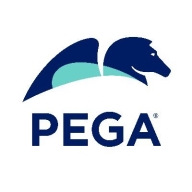

Pega Platform and Zoho Creator are both prominent players in the low-code development space, offering robust solutions for businesses. While both excel in different areas, Pega Platform tends to have an edge in enterprise-level solutions due to its comprehensive feature set, despite some critiques regarding cost and complexity.
Features: Pega Platform is known for its comprehensive case management, integration services, and rapid prototyping capabilities. It provides enterprise-level BPM solutions and a low-code platform that simplifies deployment and application setup. Zoho Creator stands out for its ability to create interactive reports and page layouts, leveraging flexibility through support for HTML and CSS, which allows for substantial customization. The platform is easy to use and promotes quick development, making it an attractive choice for both non-developers and experienced users.
Room for Improvement: Pega Platform faces challenges with its steep learning curve and high licensing costs, particularly affecting smaller enterprises. Users have reported issues with the user experience and integration simplicity, as well as a need for an enhanced cloud presence. Meanwhile, Zoho Creator could improve its data management for larger datasets and broaden user interface customization options. There is also room to enhance its integration capabilities and support channels.
Ease of Deployment and Customer Service: Pega Platform offers diverse deployment options, including on-premises, hybrid, and public cloud setups. Despite mixed reviews on technical support, its community and documentation are praised. Zoho Creator is noted for its user-friendly and affordable setup, with generally positive feedback on customer service, though some users experience long response times.
Pricing and ROI: Pega Platform's pricing model is flexible yet considered high, which may deter smaller businesses. Nevertheless, its extensive features justify the investment, with users reporting significant ROI through process efficiency improvements. Zoho Creator, on the other hand, is lauded for its affordability, offering a competitively priced entry point for startups and smaller teams, delivering strong ROI due to its flexibility and cost-effectiveness.
The technical support from Pega is very low, rating a one or two out of ten.
I never needed support from the platform standpoint, but if additional features are required, we have regular meetings with the product team for feedback.
Pega's technical support team is very helpful.
There are certain limitations if the data volume is large due to execution limits.
Pega introduced Constellation, which allows a user to build a more engaging visual experience.
My learning curve in robotics has been challenging.
In terms of scalability, there are certain limitations if the data volume is large due to execution limits.
The pricing is expensive, and this is an issue.
Pega is priced higher than open-source options like Flowable but is suitable for large-scale industries like banking and insurance.
Pricing is a little on the higher side for the Indian market, especially for mid-sized and small-sized companies with 30 to 40 users.
Management capabilities such as dashboards.
Pega Platform is excellent for enterprise-level solutions with integrations to entire systems, including case management, service orchestration, CRM, decision-making capabilities, digital process automation, and AI-driven functionalities.
Zoho Creator provides a quick turnaround in terms of project closures, which is the most important benefit.


Pega Platform facilitates business process management, case management, and workflow automation for industries like banking, insurance, and healthcare. It supports digital transformation and customer service enhancements with its low-code capabilities and seamless integrations.
Pega Platform enables users to create efficient systems for case management, financial operations, and digital transformations. It provides tools for client onboarding, quoting, claims processing, customer experience improvements, and content management. Pega's low-code approach allows for the automation of complex processes, making it suitable for enterprises looking for adaptability and rapid deployment. While it offers strong real-time analytics and decision automation, users acknowledge challenges in user interface, integration, and performance aspects. High costs and a learning curve need attention, and enhancements in AI features and cloud services are desired.
What are the key features of Pega Platform?In banking, Pega Platform automates loan processing, accelerates customer onboarding, and manages compliance. Insurance companies benefit from streamlined claims processing and policy management. Healthcare sectors use the platform for patient engagement and care coordination, enabling organizations to adapt quickly to changing industry requirements.
Zoho Creator is a web-based platform that lets everyone build custom business applications without any prior technical knowledge
Zoho Creator offers a first of its kind drag-n-drop interface to create tables/forms, design, schedule workflows and perform a variety of automated actions.
Zoho Creator's powerful tools for data collection and management, analysis, reporting and collaboration make it the smart choice for small to large organizations to run their business online, without any additional costs, infrastructure, or software.
Zoho Creator is used by more than 400,000 users and 100,000+ apps have been already created. Don't let complex looking workflows and business rules scare you.
Zoho Creator is completely non-programmer friendly. Use the intuitive and feature-rich platform to build your custom database applications. Just write your business rules and let the software handle deployment and hosting. You can create your own forms/tables afresh or import data from standard formats (.xls .csv .mdb) and get your database application online within minutes, really!
We monitor all Rapid Application Development Software reviews to prevent fraudulent reviews and keep review quality high. We do not post reviews by company employees or direct competitors. We validate each review for authenticity via cross-reference with LinkedIn, and personal follow-up with the reviewer when necessary.